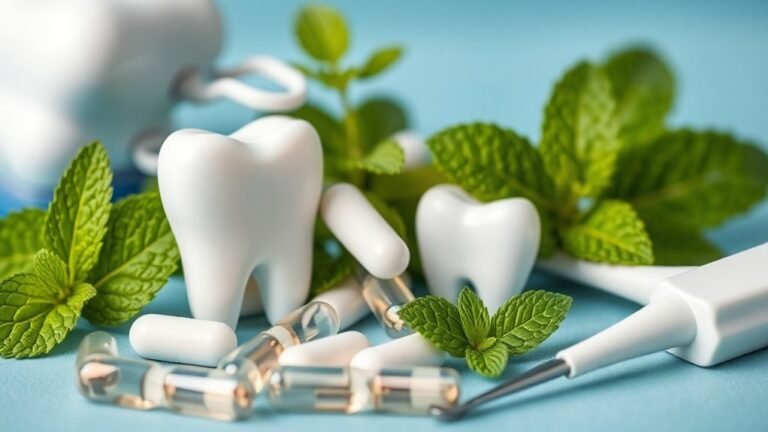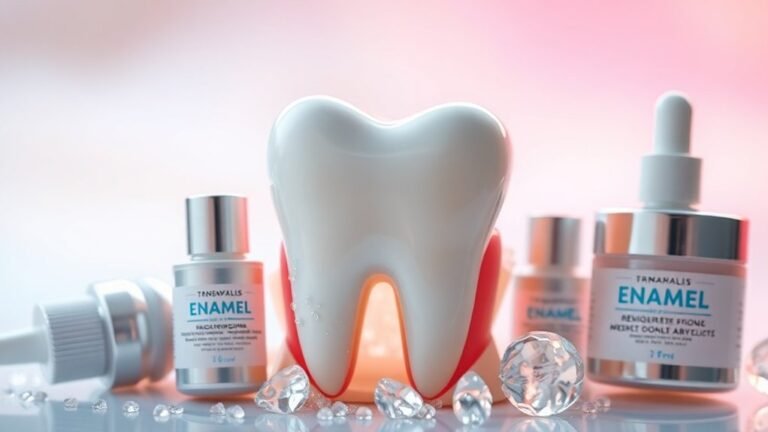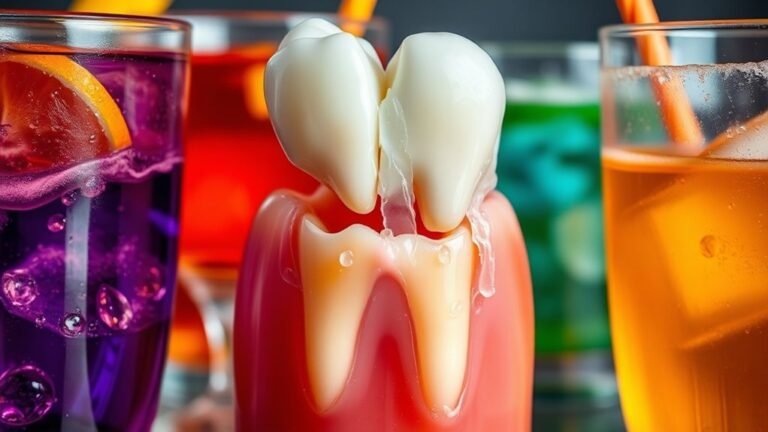Sugar-Feeding Bacteria Like Streptococcus Mutans Cause Rapid Tooth Decay
Sugar-feeding bacteria like Streptococcus mutans play an essential role in rapid tooth decay. These bacteria thrive on sugars, especially sucrose, converting them into acids that erode enamel. When you frequently consume sugar, the resultant acid lowers your mouth’s pH, leading to further demineralization of teeth. This cycle of acid production and enamel weakening makes you more susceptible to cavities. To understand how to combat these bacteria effectively, you might want to explore more preventive strategies.
Key Takeaways
- Streptococcus mutans thrives on sugar, particularly sucrose, leading to increased acid production and rapid tooth decay.
- The acids produced by S. mutans lower mouth pH, causing enamel demineralization and weakening teeth.
- Frequent sugar consumption creates a cycle of decay, where ongoing acid attacks exacerbate enamel erosion.
- Maintaining good oral hygiene, including regular brushing and flossing, helps combat the effects of sugar-feeding bacteria.
- Reducing dietary sugar and using fluoride toothpaste can strengthen enamel and inhibit the growth of harmful bacteria like S. mutans.
The Role of Streptococcus Mutans in Tooth Decay
Although many bacteria inhabit your mouth, Streptococcus mutans plays a pivotal role in tooth decay. This species of sugar-feeding bacteria thrives on carbohydrates, particularly sucrose, converting them into acids. These acids contribute to the demineralization of tooth enamel, leading to cavities. As you consume sugary foods, S. mutans proliferates, forming a biofilm known as plaque. This plaque buildup serves as a protective layer for the bacteria, enhancing their ability to resist saliva and antimicrobial agents. Over time, the continuous acid production from S. mutans exacerbates enamel erosion and accelerates tooth decay. Understanding the mechanisms by which Streptococcus mutans operates highlights the importance of oral hygiene in preventing the detrimental effects of these sugar-feeding bacteria on your dental health.
How Sugar Consumption Fuels Bacterial Growth
When you consume sugar, it doesn’t just satisfy your sweet tooth; it also creates an ideal environment for bacteria like Streptococcus mutans to flourish. This bacterium metabolizes sugars, producing acid as a byproduct. This acid lowers the pH in your mouth, leading to demineralization of tooth enamel. With frequent sugar intake, the acid attacks become more pronounced and prolonged, accelerating the process of rapid tooth decay. The more sugar you consume, the more energy you provide to these bacteria, allowing them to proliferate exponentially. This vicious cycle means that not only does your sugar habit contribute to bacterial growth, but it also heightens your risk of developing cavities. Understanding this relationship is essential for maintaining oral health.
The Process of Tooth Erosion and Cavities
Frequent sugar consumption leads to a series of biochemical reactions that result in tooth erosion and cavities. When you consume sugar, bacteria like Streptococcus mutans ferment it, producing acids that demineralize tooth enamel. This process initiates a cycle of decay, as weakened enamel allows for further bacterial invasion.
| Stage | Description | Impact on Teeth |
|---|---|---|
| Sugar Intake | Consumption of sugary foods and drinks | Provides substrate for bacteria |
| Acid Production | Bacteria metabolize sugar, producing acid | Demineralizes tooth enamel |
| Erosion and Cavities | Continued acid exposure leads to cavities | Structural damage to teeth |
Understanding this process emphasizes the importance of limiting sugar intake to maintain dental health.
Strategies to Combat Sugar-Feeding Bacteria
To effectively combat sugar-feeding bacteria and mitigate their harmful impact on dental health, you must implement a multifaceted approach. Start by reducing dietary sugar intake, focusing on whole foods and complex carbohydrates. Regularly using fluoride toothpaste strengthens enamel, making it more resistant to acid attacks from bacteria. Incorporating antimicrobial mouthwashes can help inhibit bacterial growth and biofilm formation. Daily flossing and brushing twice a day are essential; they physically remove plaque where bacteria thrive. Additionally, consider probiotics that target oral health, as they may help balance the bacterial ecosystem in your mouth. Finally, scheduling routine dental check-ups guarantees early detection and intervention, safeguarding your teeth against decay caused by Streptococcus mutans and similar pathogens.
Maintaining Oral Health in a Sugar-Filled World
As sugar consumption continues to rise globally, maintaining oral health becomes increasingly challenging. To effectively combat the adverse effects of sugar on your teeth, consider adopting these strategies:
- Limit sugar intake: Be mindful of hidden sugars in processed foods.
- Choose healthier snacks: Opt for fruits, vegetables, and nuts instead of sugary treats.
- Enhance oral hygiene: Brush twice daily and floss regularly to remove plaque.
- Use fluoride products: Incorporate fluoride toothpaste and mouthwash to strengthen enamel.
- Stay hydrated: Drink plenty of water to help wash away food particles and bacteria.
Frequently Asked Questions
Can Streptococcus Mutans Infect Other Parts of the Body?
Yes, Streptococcus mutans can infect other parts of the body, particularly if it enters the bloodstream. However, it’s primarily associated with dental issues rather than systemic infections, making its impact more localized than widespread.
Are There Non-Sugar Foods That Promote Bacterial Growth?
Yes, non-sugar foods can promote bacterial growth. Ingredients like refined carbohydrates and certain starches can ferment in the mouth, creating an environment where bacteria thrive, potentially leading to dental issues if oral hygiene isn’t maintained.
How Quickly Can Tooth Decay Progress With High Sugar Intake?
Tooth decay can progress rapidly, sometimes within just a few months, when you consume high sugar diets. Bacteria thrive on sugar, producing acids that erode enamel, leading to cavities and potential tooth loss.
Does Saliva Production Impact Streptococcus Mutans Activity?
Saliva acts like a shield, moderating Streptococcus mutans activity. Increased saliva production helps neutralize acids and wash away food particles, reducing bacterial growth and, ultimately, your risk of tooth decay. So, keep hydrated for healthier teeth.
Are There Genetic Factors Influencing Susceptibility to Tooth Decay?
Yes, genetic factors can influence your susceptibility to tooth decay. Variations in genes affecting enamel strength, saliva composition, and immune response can make you more or less prone to decay, regardless of oral hygiene practices.
Conclusion
In conclusion, just as a wildfire consumes everything in its path, sugar acts as fuel for Streptococcus mutans, leading to rapid tooth decay. Understanding the relationship between sugar consumption and bacterial growth is vital for maintaining oral health. By implementing effective strategies to combat these harmful bacteria, you can protect your teeth from erosion and cavities. Staying vigilant in a world filled with sugary temptations is essential for preserving your smile and overall dental health.






